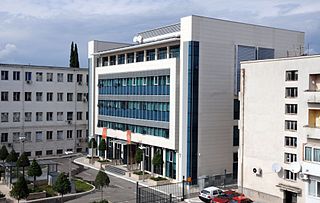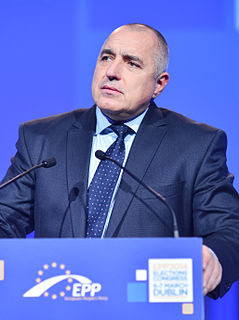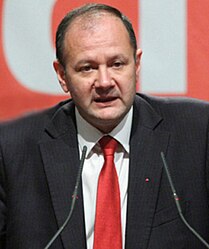
The politics of Bulgaria take place in a framework of a parliamentary representative democratic republic, whereby the Prime minister is the head of government, and of a multi-party system. Executive power is exercised by the government. Legislative power is vested in both the government and the National Assembly. The Judiciary is independent of the executive and the legislature.
The politics of Norway take place in the framework of a parliamentary representative democratic constitutional monarchy. Executive power is exercised by the Council of State, the cabinet, led by the Prime Minister of Norway. Legislative power is vested in both the government and the legislature, the Storting, elected within a multi-party system. The judiciary is independent of the executive branch and the legislature.
A hung parliament is a term used in legislatures under the Westminster system to describe a situation in which no particular political party or pre-existing coalition has an absolute majority of legislators in a parliament or other legislature. This situation is also known, albeit less commonly, as a balanced parliament, or as a legislature under no overall control, and can result in a minority government. The term is not relevant in multi-party systems where it is rare for a single party to hold a majority.

Parliamentary elections were held in Norway on 11 and 12 September 2005. The result was a victory for the opposition centre-left Red-Green Coalition, which got 48.0% of the votes and won 87 out of 169 seats, dominated by the Labour Party's 61 seats. The three-party centre-right government coalition won 44 seats and the right wing Progress Party won 38, becoming the largest opposition party. Voter turnout was 77.1%, an increase of 2 percentage points compared to the 2001 elections.
Coalition for a European Montenegro was the ruling political alliance in Montenegro headed by Milo Đukanović's Democratic Party of Socialists (DPS).

The History of Bulgaria since 1990 is the period of Bulgarian history that begins after the fall of Communism and the transition to Capitalism.

The government of Montenegro is the executive branch of state authority in Montenegro. It is headed by the prime minister. It comprises the prime minister, the deputy prime ministers as well as ministers.
Parliamentary elections were held in Montenegro on 22 April 2001. The result was a victory for the Victory is of Montenegro alliance formed by the Democratic Party of Socialists of Montenegro and the Social Democratic Party of Montenegro, which won 36 of the 77 seats.

The eighty-six cabinet of Bulgaria also known as the three-party coalition cabinet ruled from August 17, 2005 to July 27, 2009. The cabinet was formed with the coalition of the three leading at that time parties BSP, NDSV and DPS - in order of their parliamentary representation. Their parliamentary representation also determined the number of cabinet appointments.

Parliamentary elections were held in Bulgaria on 5 July 2009. With 40% of the vote, the decisive winner of the elections was the established in 2006 personalistic party of Boyko Borisov - GERB. The Socialist Party, in power before the election, was in second place, with around 18%. Оnce-ruling National Movement Simeon II did not cross the 4% threshold and won no seats. The turnout was 60.2%, one of the lowest ever. Following the election, GERB leader Boyko Borisov became Prime Minister. Just like all the previous parliamentary elections since the fall of communism, the government was not re-elected.

Parliamentary elections were held in Bulgaria on 12 May 2013, two months ahead of schedule. Protests had forced the resignation of the GERB government in February, leading to the election being moved up.

The European Parliament election of 2014 in Bulgaria was held on 25 May 2014 to elect the Members of the European Parliament from Bulgaria to the European Parliament as part of the larger European Parliament election. After a decision by the European Council in 2013, Bulgaria was allocated 17 seats in the European Parliament for the Eighth European Parliament.

Plamen Vasilev Oresharski is a Bulgarian politician who served as Prime Minister of Bulgaria from 2013 to 2014. Previously Oresharski was Minister of Finance from 2005 to 2009 in the Cabinet of the Triple Coalition with Prime Minister Sergei Stanishev.

Mihail Raykov Mikov is a Bulgarian politician who was Chairman of the Bulgarian Socialist Party (BSP) from 2014 to 2016. He is a parliamentarian with six consecutive terms as a deputy in the National Assembly. His career in the legislature culminated in his election as Chairman of the 42nd National Assembly on May 21, 2013. Mikov was Minister of Interior from 24 April 2008 to 29 July 2009 in Sergei Stanishev's government. Currently he is the leader of the Parliamentary Group of BSP Left Bulgaria in the 43rd National Assembly, the coalition led by the socialist party. Mihail Mikov was elected as Chairman of the BSP on 27 July 2014, succeeding Sergei Stanishev. He won a run-off against outgoing Economy and Energy Minister Dragomir Stoynev with a final tally of 377-333.

The eighty-fifth cabinet of Bulgaria also known as the Tsar's cabinet ruled from July 24, 2001 to August 17, 2005. Although the National Movement Simeon II won half the seats in the 2001 parliamentary election, and therefore could have probably governed alone, a cabinet was formed as a coalition between the winners and the Movement for Rights and Freedoms. Although not in a coalition with the Tsar's party, the Bulgarian Socialist Party held two cabinet posts. Their members sat as independents.

Parliamentary elections were held in Bulgaria on 5 October 2014 to elect the 43rd National Assembly. GERB remained the largest party, winning 84 of the 240 seats with around a third of the vote. A total of eight parties won seats, the first time since the beginning of democratic elections in 1990 that more than seven parties entered parliament. Boyko Borisov then became prime minister as head of a coalition with the Reformist Bloc and with outside support from the Patriotic Front and the Alternative for Bulgarian Revival.
















